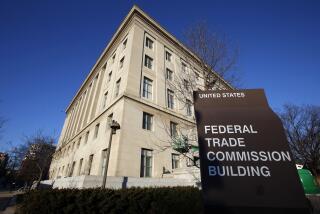High Court Hears Case Weighing SEC’s Authority
- Share via
The Securities and Exchange Commission on Tuesday asked the U.S. Supreme Court to rule that a telephone investment plan qualified as a security, warning that the agency’s ability to protect investors otherwise could be harmed.
The SEC is appealing a lower court’s dismissal of its suit against the investment plan on the grounds that an investment contract doesn’t qualify as a security if investors are promised a fixed, rather than variable, return.
A 1930s law gives the SEC the power to oversee stocks, bonds, debentures and other securities.
Solicitor General Theodore B. Olson, representing the SEC, told the nine high court justices that Congress loosely defined “investment contract” in the Exchange Act as a catchall definition for a security to accommodate the ever-changing land- scape of securities offered to investors.
“A catchall must be a catchall,” Olson argued.
In its written brief, the SEC said it continued to bring many actions each year against schemes involving investment contracts with fixed or guaranteed returns.
But an attorney for Charles Edwards, the chief executive of Georgia-based ETS Payphones Inc., argued that the ETS contracts were a “commercial lease agreement” covered by state law and that the SEC had no right to pursue his client.
Asked by justices Ruth Bader Ginsburg and Sandra Day O’Connor why Congress would want to exclude a transaction such as ETS’ from the definition of an investment contract, Edwards’ attorney, Michael Wolensky, said the lease agreements had no investment risk.
The SEC’s September 2000 lawsuit against Edwards accused him of running a massive Ponzi scheme that brought in $300 million from more than 10,000 investors.
Under the plan, people would buy pay phones from ETS and then lease them back for five years of fixed payments of $82 a month, for an annual return of 14%.
The SEC said ETS told investors that it was profitable and “virtually recession-proof,” but the agency said it wasn’t.
This prompted Chief Justice William H. Rehnquist to say of the plan, “This isn’t exactly Warren Buffett,” a reference to the billionaire investor whose stock holdings are closely watched.
A ruling in the case is due by the end of June.
More to Read
Inside the business of entertainment
The Wide Shot brings you news, analysis and insights on everything from streaming wars to production — and what it all means for the future.
You may occasionally receive promotional content from the Los Angeles Times.










